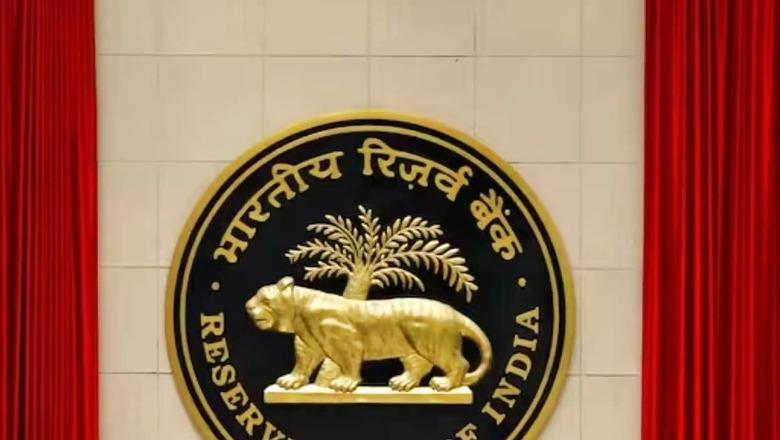
views
The RBI’s monetary policy committee (MPC) on Thursday, August 10, unanimously decided to keep the key repo rate unchanged at 6.5 per cent, in line with expectations. This is the third time in a row that the central bank has paused the key interest rates. It has revised upwards FY24 inflation forecast to 5.4 per cent from the 5.1 per cent estimated earlier, while maintaining FY24 GDP projection at 6.5 per cent.
RBI Policy Decisions
The RBI on Thursday kept the repo rate unchanged at 6.5 per cent. The RBI MPC also kept the SDF unchanged at 6.25 per cent, and MSF and Bank Rates maintained at 6.75 per cent. The SDF is the lower band of the interest rate corridor, while the MSF is the upper band.
The central bank, however, decided to make it mandatory for banks to maintain an incremental cash reserve ratio (I-CRR) from August 12, 2023. “It has been decided that with effect from the fortnight beginning August 12, 2023, scheduled banks shall maintain an incremental cash reserve ratio (I-CRR) of 10 per cent on the increase in their net demand and time liabilities (NDTL) between May 19, 2023, and July 28, 2023,” said RBI Governor Shaktikanta Das, while announcing the August 2023 bi-monthly monetary policy.
The monetary policy stance is maintained at the ‘Withdrawal of Accommodation’ with the MPC voting in favour of the interest rate decision in the ratio of 5:1.
FY24 Inflation Forecast Raised
The RBI has revised upwards inflation projection from 5.1 per cent to 5.4 per cent for the current financial year 2023-24.
“Given the continuing uncertainties, our latest CPI inflation projections for 2023-24, assuming a normal monsoon, is revised to 5.4 per cent, with Q2 at 6.2 per cent, Q3 at 5.7 per cent and Q4 at 5.2 per cent. CPI inflation for Q1:2024-25 is projected at 5.2 per cent,” the RBI governor said.
He said uncertainties, however, remain on domestic food price outlook due to sudden weather events and possible El Niño conditions in August and beyond. “Inflation is expected to surge in July and August due to vegetable prices, MPC remains resolute in aligning inflation to its 4 per cent target.”
FY24 GDP Projection Unchanged
The RBI also kept its FY24 real GDP projection unchanged at 6.5 per cent. Das said, “Real GDP growth for 2023-24 is projected at 6.5 per cent with Q1 at 8.0 per cent; Q2 at 6.5 per cent; Q3 at 6.0 per cent; and Q4 at 5.7 per cent. Real GDP growth for Q1:2024-25 is projected at 6.6 per cent.”
The RBI governor said the momentum of overall economic activity in India continues to be positive. On the supply side, crop sowing has picked up with steady progress in the south-west monsoon. The temporal and spatial distribution of monsoon has, however, been uneven.
UPI Lite: Transaction Limit Raised From 200 to Rs 500
With the objective of harnessing new technologies for enhancing the digital payments experience for users, it is proposed to (i) enable ‘Conversational Payments’ on UPI, which will enable users to engage in conversation with AI-powered systems to make payments; (ii) introduce offline payments on UPI using near-field communication (NFC) technology through ‘UPI-Lite’ on-device wallet; and (iii) enhance the transaction limit for small value digital payments in off-line mode from Rs 200 to Rs 500 within the overall limit of Rs 2,000 per payment instrument. These initiatives will further deepen the reach and use of digital payments in the country.
Review of Regulatory Framework for Financial Benchmark Administrators
The RBI has decided to revise the extant regulations issued in June 2019 and put in place a comprehensive, risk-based framework for administration of financial benchmarks. This will cover all benchmarks related to foreign exchange, interest rates, money markets and government securities. The revised directions will provide greater assurance about the accuracy and integrity of financial benchmarks.
Review of Regulatory Framework for Infrastructure Debt Fund – NBFCs
Currently, infrastructure debt funds (IDFs) provide refinancing facilities for lenders in the infrastructure sector. The extant regulatory framework for IDFs has been revised.
The key changes in the revised framework are: (i) withdrawal of the requirement to have a sponsor for the IDFs; (ii) allowing IDFs to finance toll-operate-transfer (ToT) projects as direct lenders; (iii) permitting IDFs to raise funds through ECBs; and (iv) making tri-partite agreements optional for PPP projects. These changes are expected to further augment the capacity for infrastructure financing in the country.
Transparency in Interest Rate Reset of EMI-based Floating Interest Loans
The RBI said it is proposed to put in place a transparent framework for reset of interest rates on floating interest loans. The framework will require regulated entities to (i) clearly communicate with borrowers for resetting the tenor and/or EMI; (ii) provide options for switching to fixed rate loans or foreclosure of loans; (iii) disclose various charges incidental to the exercise of the options; and (iv) ensure proper communication of key information to borrowers. These measures will further strengthen consumer protection.
Supervisory Data Instructions
The RBI has, from time to time, issued several guidelines on submission of supervisory returns by supervised entities. It has been decided to consolidate and harmonise such guidelines into a single Master Direction to reduce compliance burden and to promote greater ease of doing business for supervised entities.
Public Tech Platform for Frictionless Credit
The RBI, in association with the Reserve Bank Innovation Hub (RBIH), started a pilot project in September 2022 for frictionless credit delivery through end-to-end digital processes, starting with Kisan Credit Card (KCC) loans.
The pilot for KCC loans is currently operational in select districts of Madhya Pradesh, Tamil Nadu, Karnataka, UP and Maharashtra. Recently, dairy loans have been included in the pilot project in select districts of Gujarat. Based on the learnings from the pilots and to expand the scope of end-to-end digital lending processes, a Public Tech Platform for Frictionless Credit delivery is being developed by the RBIH.
The Platform is intended to be rolled out as a pilot project in a calibrated manner. It will have an open architecture and open Application Programming Interface (API) and Standards, to which all financial sector players can connect seamlessly. This initiative will accelerate the penetration of credit to hitherto underserved regions and further deepen financial inclusion.


















Comments
0 comment